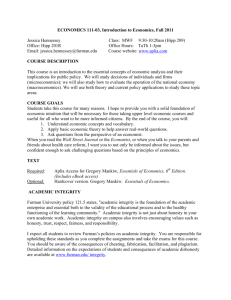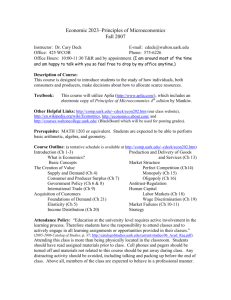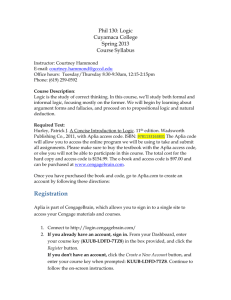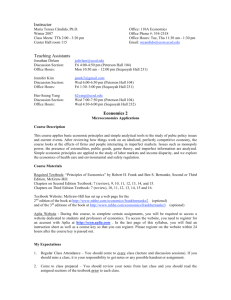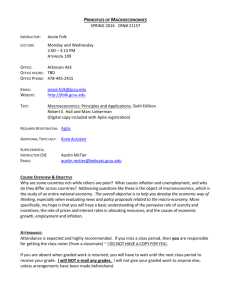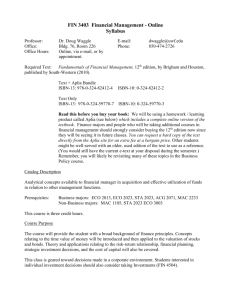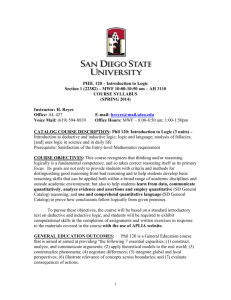Economics 303: Money & Banking
advertisement
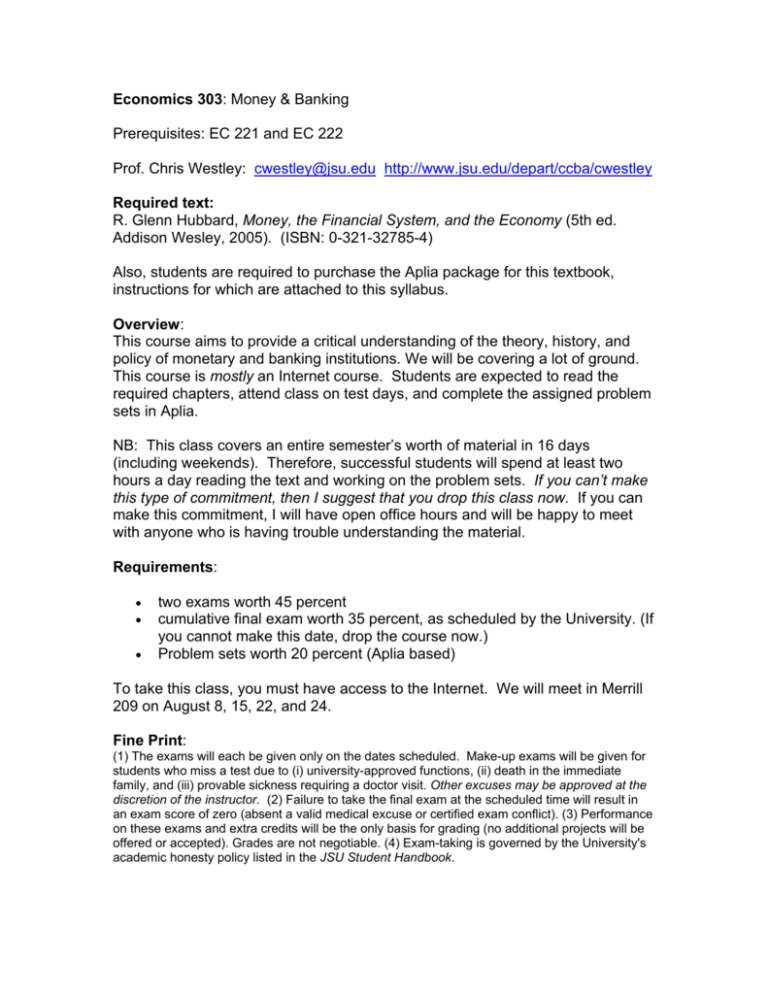
Economics 303: Money & Banking Prerequisites: EC 221 and EC 222 Prof. Chris Westley: cwestley@jsu.edu http://www.jsu.edu/depart/ccba/cwestley Required text: R. Glenn Hubbard, Money, the Financial System, and the Economy (5th ed. Addison Wesley, 2005). (ISBN: 0-321-32785-4) Also, students are required to purchase the Aplia package for this textbook, instructions for which are attached to this syllabus. Overview: This course aims to provide a critical understanding of the theory, history, and policy of monetary and banking institutions. We will be covering a lot of ground. This course is mostly an Internet course. Students are expected to read the required chapters, attend class on test days, and complete the assigned problem sets in Aplia. NB: This class covers an entire semester’s worth of material in 16 days (including weekends). Therefore, successful students will spend at least two hours a day reading the text and working on the problem sets. If you can’t make this type of commitment, then I suggest that you drop this class now. If you can make this commitment, I will have open office hours and will be happy to meet with anyone who is having trouble understanding the material. Requirements: • • • two exams worth 45 percent cumulative final exam worth 35 percent, as scheduled by the University. (If you cannot make this date, drop the course now.) Problem sets worth 20 percent (Aplia based) To take this class, you must have access to the Internet. We will meet in Merrill 209 on August 8, 15, 22, and 24. Fine Print: (1) The exams will each be given only on the dates scheduled. Make-up exams will be given for students who miss a test due to (i) university-approved functions, (ii) death in the immediate family, and (iii) provable sickness requiring a doctor visit. Other excuses may be approved at the discretion of the instructor. (2) Failure to take the final exam at the scheduled time will result in an exam score of zero (absent a valid medical excuse or certified exam conflict). (3) Performance on these exams and extra credits will be the only basis for grading (no additional projects will be offered or accepted). Grades are not negotiable. (4) Exam-taking is governed by the University's academic honesty policy listed in the JSU Student Handbook. Grade Appeals: I handle grade appeals in only one fashion. Should you be dissatisfied with your grade on any work, do the following: (1) Write a short description of why you believe you should have received a higher grade. Simply asking for more points (e.g., “I need a C so my GPA doesn’t drop”) is insufficient. If your statement concerns the fairness of the grade, then you must convince me that you were treated unfairly. (2) Hand in the test or assignment in question along with your written statement no later than the next class period after it was returned to you. You should not infer that following this process will guarantee a higher grade. Attendance: This class will be mostly an Internet course. We will meet on test days (August 15 and 22) and on the day of the final (August 24) in 209 Merrill. Other: Any student who receives failing grades during this course is urged to discuss this with the professor. Tests and calculators: Sharing calculators is strictly forbidden during tests because answers can be passed too easily. All tests will be graded via Scantron machines. Students are expected to purchase Scantron Form 882 for each test and the final. See what it looks like here. (Forms are on sale at the campus bookstore.) Disability Accommodations Statement: Any individual who qualifies for reasonable accommodations under the Americans with Disabilities Act or Section 504 of the Rehabilitation Act of 1973 should contact the instructor immediately. Schedule of Lectures, Exams, and Readings A. Fundamentals of Money and Financial Markets 1. The nature and evolution of money (read: Hubbard ch. 1,2) 2. Overview of the financial system (read: Hubbard ch. 3), 3. Interest rates and rates of return (read: Hubbard ch. 4) 4. Determining interest rates (read: Hubbard, ch. 6),) 5. Risk and term structure of interest rates (read: Hubbard, ch. 7), Credit and debit card primer 6. First exam: August 15, 2006 B. Commercial Banking, Regulation, and Inflation 7. Information and Market Efficiency (read: Hubbard, ch. 10), Reducing transaction and information costs (read: Hubbard, ch. 11) 8. What financial institutions do (read: Hubbard, ch. 12), How inflation happens 9. Inflation with 100 percent reserve banking 10. The business of banking (read: Hubbard, ch. 13) 11. Second exam: August 22, 2006 C. Central Banking, Monetary Policy, and the Economy 12. Banking regulation: crisis and response (read: Hubbard, ch. 15) 13. The money supply process (read: Hubbard, ch. 17), Organization of central banks (read: Hubbard, ch. 19, 20) 14. The conduct of monetary policy (read: Hubbard, ch. 21) Final exam: August 24 (Thursday) at 6:00 PM All changes to this syllabus will be at the discretion of the instructor. Student Registration Instructions Money and Banking Marathon S Professor Chris Westley Your course key is: DKFK-VYLR-REA7 Course Fee: $28.00 USD How to Use Aplia Step 1: Register for Your Aplia Course First Time Aplia Users: 1. Connect to http://econ.aplia.com 2. On the Sign In page, click the Go button next to "Test Your System Configuration"; this takes just a few seconds and provides detailed information on how to update your system if necessary 3. Head back to the Sign In page and click the "Register Here" link 4. Fill out the form and click Continue 5. Enter Your Course Key (above) Returning Aplia Users: 1. Connect to http://econ.aplia.com and sign in using your usual e-mail and password 2. Enter your course key (above) Problems with registration or sign in? You can always e-mail Aplia by clicking on the "Help" link in the upper-right corner of any page or by e-mailing support@aplia.com. Step 2: Pay for Your Aplia Course (You have until 08.11.06 to pay) • Instructions on the Aplia website walk you through the payment process. • You can pay online with credit, debit, or electronic check. Aplia also accepts money orders mailed to: Aplia, Inc., 959 Skyway Rd, Suite 325, San Carlos, CA 94070. Grace period for payment: You may register and use the website until 08.11.06 without paying the fee. (I have asked Aplia to extend this date by a few days.) If you are considering dropping this course during the drop/add period, do not make a payment until you decide to stay in the course. You need to pay the full amount before the end of the grace period to continue using the site. Aplia assignments: Most assignments come in pairs of practice problem sets and graded problem sets. Practice problem sets give you immediate feedback and an explanation of the correct answer. They do not count toward your homework grade. Use them to check your understanding of the material. If you feel confident about the material, you can go directly to the graded set and refer to the practice set only if you want some help. The graded problem sets have a firm due date. You can change your answers as many times as you like before the due date passes. Once the due date passes, Aplia records your grade and you can no longer change your answers or complete the assignment. In other words, Aplia assignments must be done by the due date. The software does not understand excuses. Do your assignments early to keep last minute emergencies from getting in your way. After the due date, Aplia displays the correct answers and explanations for graded problems. Student benefits of Aplia: Cramming is an ineffective learning method. Aplia lets you learn by doing -- you can apply what you hear and see in the classroom and what you read in the text. Think of the regular assignments on Aplia as a weekly economics workout. Regular work in Aplia will better prepare you for lectures and exams. Refund Policy: You are entitled to a refund if you submit a refund request to Aplia during the original grace period for payment. The grace period for your course expires on 08.11.06. No refunds will be granted after this date. Requests for refunds must be submitted by email or letter and received by Aplia within the stipulated time period. Contact support@aplia.com or write to Aplia, Inc., 959 Skyway Rd, Suite 325, San Carlos, CA 94070 USA, to request a refund. Disclaimer: I receive no monetary benefit from requiring Aplia assignments.



